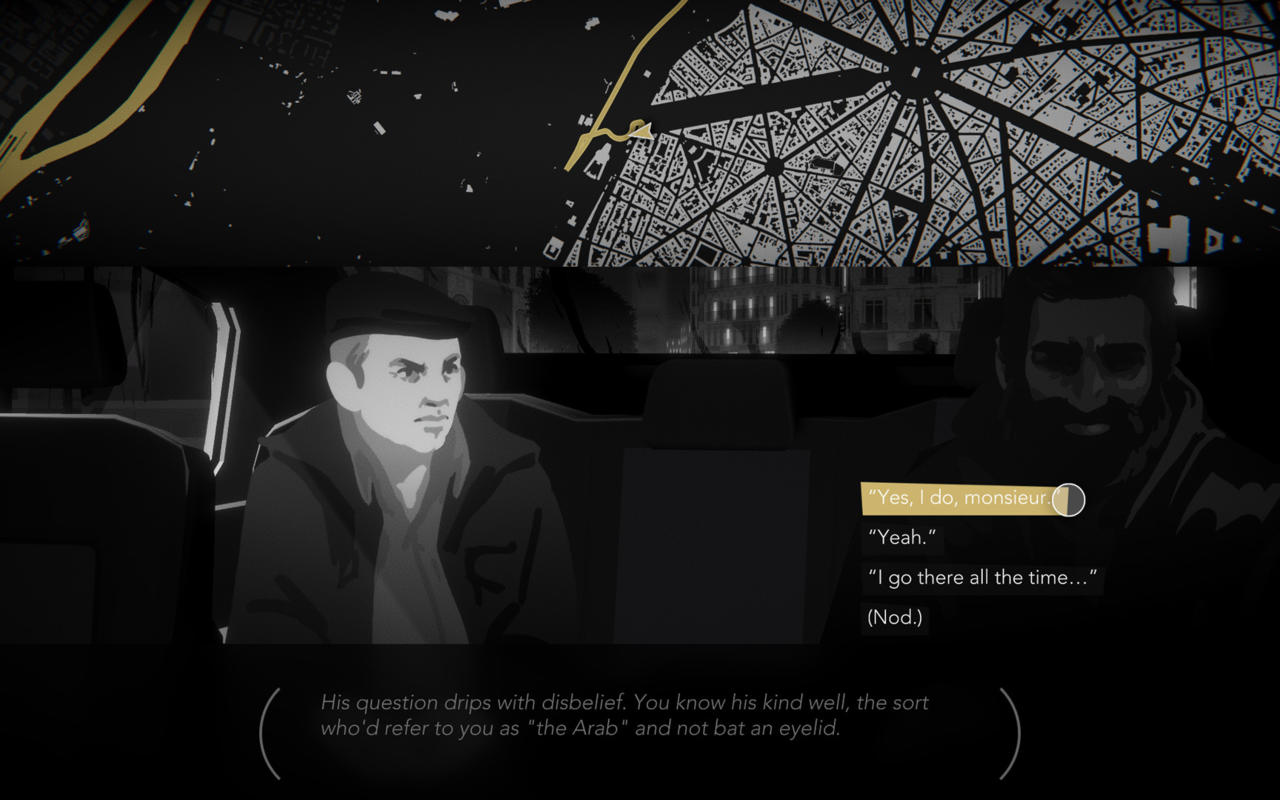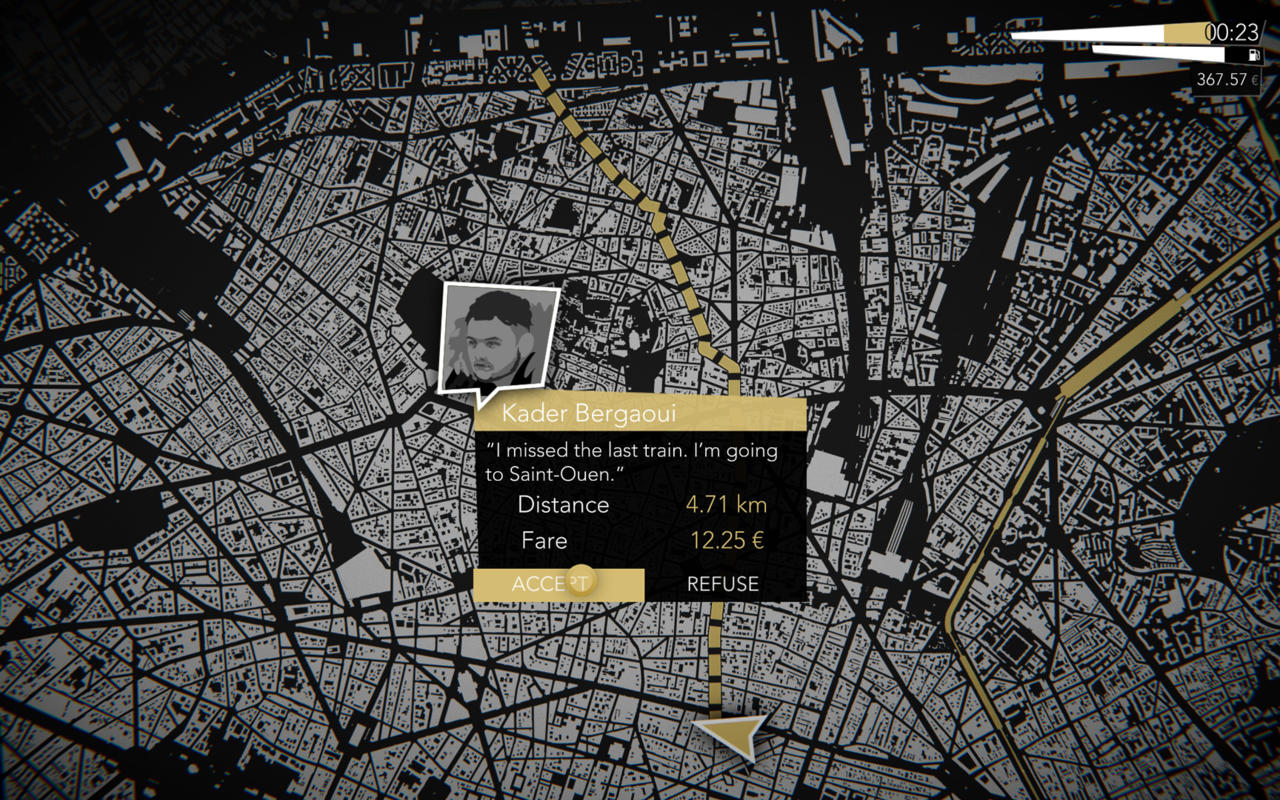The taxi cab is refitted as a confession booth in Night Call, a noir-styled visual novel that interweaves a series of murder mysteries through the tales of dozens of ordinary Parisians, the threads of their lives intermingling as you crisscross the streets of the city. Everyone's a little frail or fragile, much like the fabric of the game's core investigation, and it's the insights into people's everyday hopes, fears, and secrets that linger long after the end credits have rolled.
You play as Houssine, an Algerian immigrant living in Paris. Much of his background is elided, or only revealed in suggestion over the course of the game, but he is Muslim, sports a thick, dark beard, and works as a cab driver on the night shift. Houssine is recently back behind the wheel after an assault that saw him hospitalized and, because of who he is, a suspect in the very crime of which he was a victim.
Houssine understands what it means to feel like an outsider. There's been a terrorist attack recently, the details of which remain unspecified, but Arab men like Houssine are singled out for suspicion, their mere presence a cause for concern. His assault also resulted in the death of another person, the latest in a series of deaths that the police are keen to pin on him. One detective, however, disagrees and offers Houssine a deal: Help her investigation into the murders and he'll walk free.
It feels right that Houssine would be of interest to the police given the political climate (both current and echoed in-game) and the hints at his troubled past. And it feels authentic that someone would pressure him to essentially become an informant, the kind of blackmail that insinuates that inside the moral grey area of society lies a corrupt, black core. These themes--of feeling like you don’t belong, of a rotten system operating to exclude all but the privileged few--infuse not just Houssine’s personal experience but of many of the people he encounters, and work well in linking together an otherwise disparate collection of stories. At one point a young black man from Chicago (he’s in Paris studying to become a mime, hilariously) gets into Houssine’s cab after a humiliating run-in with the police, and they bond over their shared experiences. “I’d say the police have a problem with black people,” Houssine says, then grins, “... and Arabs.”
Each night, Houssine hits the streets to track down clues and follow up leads, all while performing his regular job. From a map of the city, you select a fare to take and watch a yellow arrow navigate to its destination, the scene then overlaying an interior shot of the cab with Houssine front right and his passenger(s) in the back seat behind.

At this point, the only thing to do is talk. Conversations are entirely text-based, with you selecting dialogue options on Houssine's behalf interspersed with his internal observations. Despite being minimally animated, with a handful of poses and expressions each, each character conveys a remarkable range of emotion and succeeds in bringing to vivid life each new person you encounter.
It's a wonderfully diverse cast of characters, too. In total there are 75 passengers to meet over the course of the game, drawn from a broad range of ages, social classes, ethnicities, sexualities and, in one or possibly two cases, dimensions. They each have their own stories to tell, and Houssine seems to be the man chosen to hear them all.
That's because while he's an outsider, as a cab driver, Houssine's difference is camouflaged. Many of the people he picks up are oblivious to him, at least at first. Couples discuss private matters as if he is not there. Lone passengers mutter to themselves, seemingly unaware of the possibility there's a real human being sharing the vehicle with them. When they do notice him, one passenger scoffs at the idea that a lowly cab driver could have any useful advice. Another passenger assumes Houssine has certain political sympathies because he's a brown, working-class man. "According to the people of this country, you don't count," one character tells him, with weary resignation. Houssine is both othered and unseen, tagged as different and yet simultaneously erased.

However, some passengers are immediately warm towards Houssine, while others, if distant or cautious to begin with, soon find themselves disarmed. Regardless of their disposition, however, they're all willing to reveal the most intimate details of their inner lives with often only the slightest bit of delicate prodding. There's the politician who is at the end of his tether over endemic corruption and pleads with Houssine to help him leak confidential documents. There's the lesbian couple who are loudly debating the merits of the prospective sperm donor with whom they have just concluded a "date." There's the former porn actress who is eager to talk all about her new pro-union production company making gender-positive porn movies. These tales are often funny, moving, and sweet--but moreover, they're always fascinating and exceptionally well-written.
In between these fares, Houssine can visit various locations to further his investigation. He knows someone who works somewhere who might have some information, that sort of thing. But these scenes don't feel as fleshed out as the cab ride conversations. It's not made clear how Houssine knows to go to these places or why many of these contacts are able to help him. Indeed, much of the casework he's pursuing is obscured, as if key details have been intentionally, frustratingly, left out of reach. When Houssine returns to his apartment each morning and assesses the clues he’s uncovered--presented as hand-written notes pinned to a board--I found it difficult to interpret what much of it meant. By the time Houssine was called upon to accuse a suspect, I made an unconvincing guess that just happened to be correct.

The structure of this series of murder mysteries is strange. There are three cases to choose from when you begin a new game, and each is framed the same way: Houssine finds himself the inadvertent victim of a serial killer and strong-armed by a detective to assist the investigation. Recurring characters populate each case, though if you meet someone in one case, that relationship won't carry over into the next one. It was very odd to give a ride in the second case to the very same person I'd revealed as the killer in the first. I did learn some more things about him that complicated my feelings about how the first case was resolved, but I couldn’t help but wish I’d encountered this conversation while pursuing that first case.
Houssine can't just focus on his detective work. He needs to earn a living, too. Fuel for your cab, daily car maintenance, and repayments on your cab license are all a drain on your bank account that can only be plugged by picking up new fares. Your boss says you're like a son to him, but if you don't make enough money from your shift and can't afford to pay his cut, the car maintenance, and the license fee, he fires you on the spot and it's game over.
I like the theory behind this slight economic sim layer. It's there to ensure you feel the precariousness of Houssine's existence while also nudging you towards interacting with all the characters who don't really have anything to do with the core mystery. But my experience of the normal difficulty setting was that it felt too punitive. On my first case, I entered an all-too-real downward spiral where I simply couldn't pull Houssine out of the red and had to abandon the game. On the easy difficulty, Houssine still loses money each night, but he starts with a buffer sufficient to see the story through.

If you're going to play Night Call, then play it on the "Story" setting. The normal difficulty claims it is "the way Night Call is meant to be played." I disagree. Night Call is at its best when you're behind the wheel, gliding through the rain-kissed boulevards, lost in conversation with whichever lost soul just happened to appear in the back seat of your cab. It presents itself as a noir mystery, but the murders you’re investigating are the least interesting narrative element. Night Call’s real strength is in the stories it tells about Paris, about the people who live there and the meaningful connections you can have with them no matter how brief or unexpected. It's these people you'll remember once you've solved each case, not the fares you charged them.



















